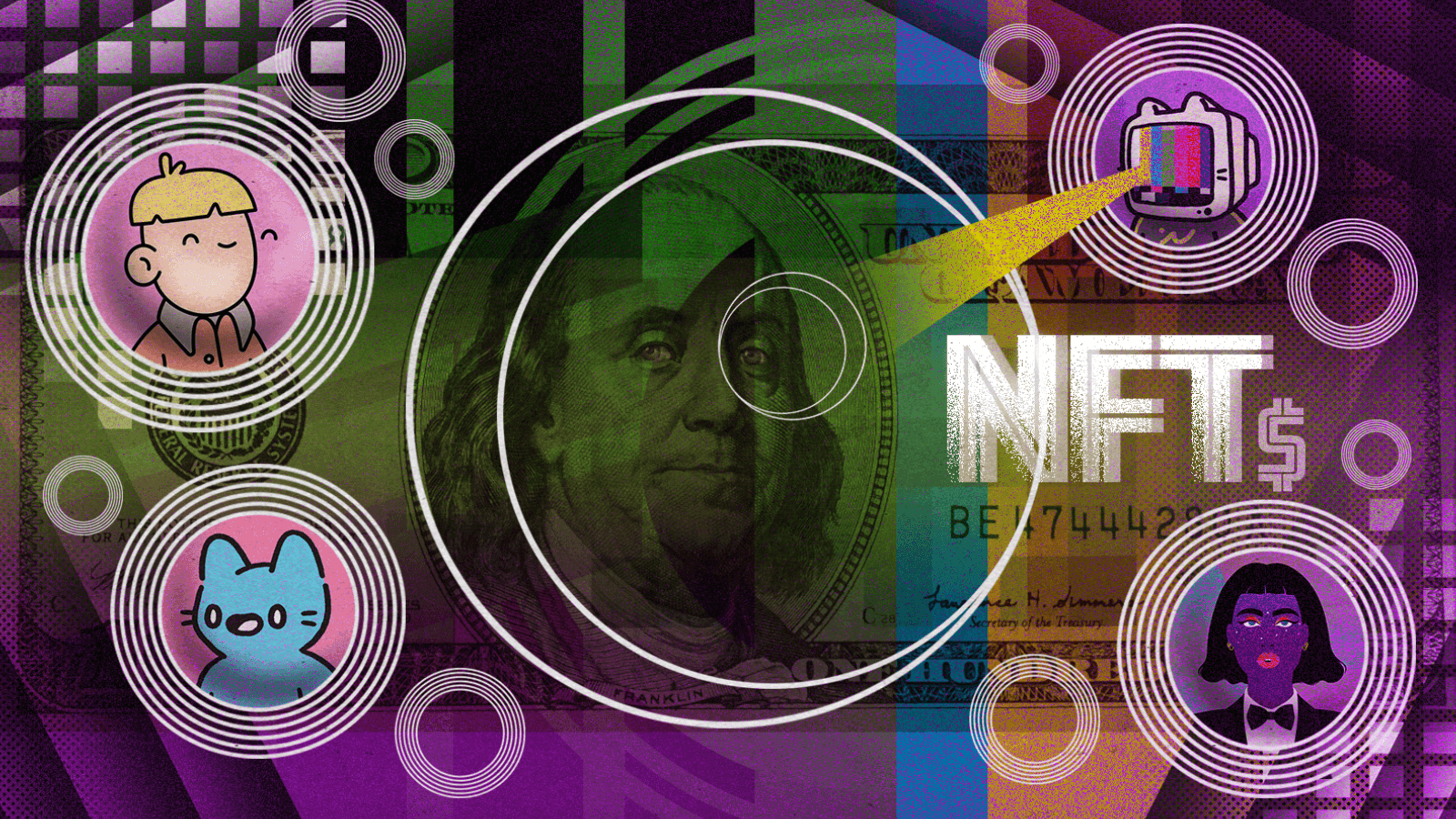Web3’s Promise of NFT Intellectual Property Rights ‘Far Off,’ Says Galaxy
Galaxy discovered that NFT projects have misled consumers over the intellectual property rights tied to purchased content

Blockworks Exclusive Art by Axel Rangel
- World of Women is the only top-25 collection attempting to confer intellectual property rights on their NFT buyers
- Yuga Labs is a $4 billion NFT company that owns 63% of the implied market cap of the top 100 NFTs
Crypto merchant bank Galaxy Digital has studied the current NFT market and concluded that Web3’s promise of digital ownership and property rights “remains far off.”
Galaxy Digital reviewed licenses for top NFT (non-fungible token) collections such as Bored Ape Yacht Club (BAYC) and CryptoPunks for its latest report, “A Survey of NFT Licenses: Facts & Fictions,” published on Friday by the firm’s research team.
While more than $118 billion in NFTs has been traded in the year-over-year period on Ethereum alone, monthly trading volume has fallen by roughly 90% since January, according to Galaxy.
These declines were largely attributed to the greater cryptocurrency market downturn that has caused many NFT investors to sell at a loss.
In contrast, NFTGo data shows the number of addresses that hold NFT investments (excluding traders) continues to rise despite the bear market, particularly leading collections.
Almost no top NFTs convey IP rights, Galaxy found
The report found that the vast majority of top collections convey zero intellectual property ownership of their underlying artwork or media.
Azuki, Doodles, Nouns and VeeFriends NFT projects were also surveyed.
Recently, some blue-chip collections including Moonbirds, CryptoPunks and Meebits have changed their terms of service — placing discussions regarding NFT license agreements in the spotlight.
In the case of Moonbirds, Galaxy found its switch from commercial use licensing to Creative Commons (CC0) — without community consent — highlights the fact that Moonbirds holders never owned any intellectual property (IP). The parent company behind Moonbirds and Oddities was calling the shots.
“CC0 licenses are too permissive,” Galaxy said, because it moves the IP fully into the public domain, which means no one truly owns it. This makes it “unfeasible for entrepreneurs to integrate NFTs into their businesses due to the lack of legal protections.”
As for newly acquired Yuga Labs collections CryptoPunks and Meebits, the report found the new license terms (which were enacted on Monday) are “significantly more professional and explicit in the ownership and license terms.”
Yuga Labs has acknowledged it has the right to unilaterally update or alter the license terms for these projects, which is “usually buried” in terms and conditions policies or “never clearly stated” on secondary trading platforms such as OpenSea.
On the other hand, Galaxy labeled BAYC’s license potentially misleading. It’s unclear whether Yuga Labs intends to confer identical commercial use rights to holders of Apes and Punks.
“If Yuga Labs does intend for the licenses to be functionally identical, they should update the BAYC license to remove misleading phrases like ‘you own the underlying Bored Ape, the Art, completely,’” the report said.
When it comes to Yuga Labs’ “Otherdeed for Otherside” NFTs, the plots of metaverse land are the first tokens issued by Yuga Labs that don’t confer commercial rights, the report said.
The NFTs’ terms and conditions state that while owners have the ability to use and transfer the virtual land they purchase, Otherdeed owners have no rights to the copyright for associated media, including artwork.
However, owners of Kodas, the creatures that roam the Otherside, do have full commercial rights for the art consistent with the BAYC license.
World of Women or world of litigation?
Galaxy’s report lauded one collection as the only project to attempt to transfer full IP rights to NFT holders: World of Women (WoW).
“WoW attempts this through the provision of a novel copyright assignment agreement,” a governance framework which transfers the copyright of each artwork to whomever owns the WoW NFT.
Still, there’s a problem. It’s unclear whether the IP agreement continues to hold in the secondary market, Galaxy pointed out.
“Unless both minter and secondary purchaser agree to these terms, there’s no guarantee that the IP assignment agreement will pass from minter to secondary purchaser,” the report said.
Galaxy concluded that metaverse realms Decentraland and The Sandbox do a “decent job of attempting to assign IP ownership to their users for user-generated content while properly disclaiming what users do and don’t own.”
The firm offered three suggested action items to achieve a future of digital ownership: NFT holders should fight for their IP rights; NFT issuers must fix their agreements for Web3 to have a chance; and the decentralized metaverse must enable intellectual property rights by default.
“While there is no requirement that NFT issuers specifically confer full intellectual property rights to purchasers, the lack of intellectual property rights undermines grand pronunciations by NFT and Web3 promoters that this technology will revolutionize digital ownership,” the report said.
Get the news in your inbox. Explore Blockworks newsletters:
- The Breakdown: Decoding crypto and the markets. Daily.
- 0xResearch: Alpha in your inbox. Think like an analyst.






